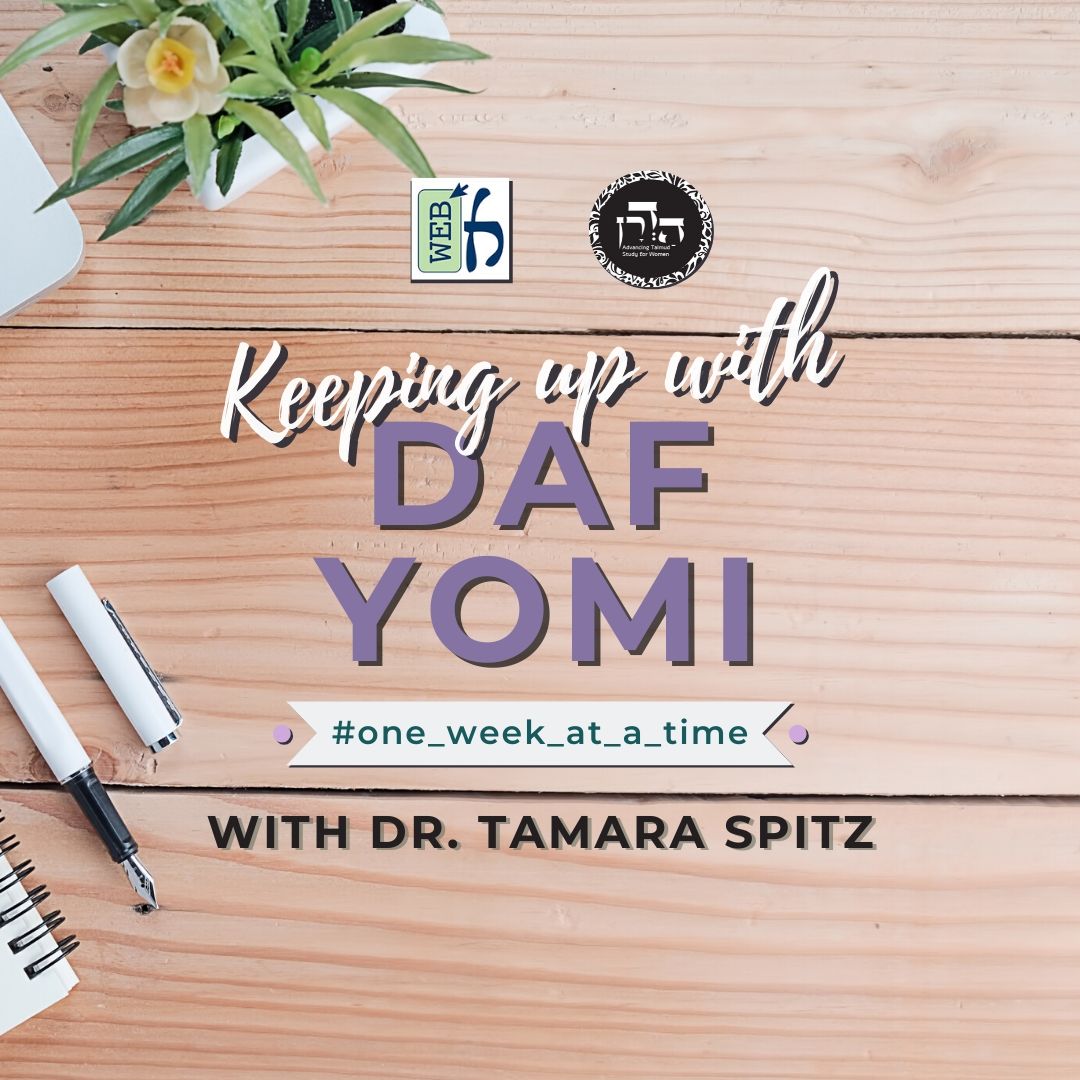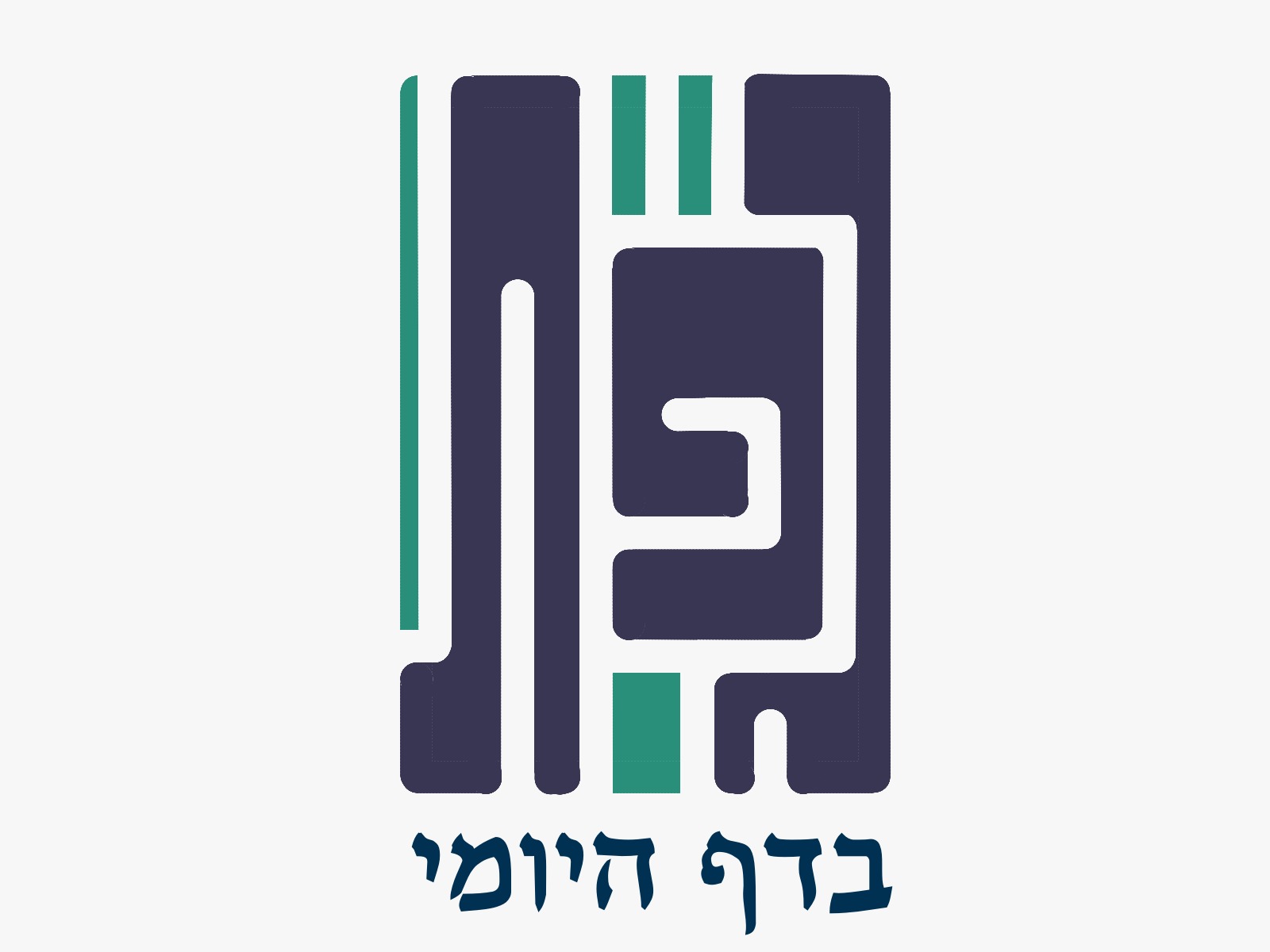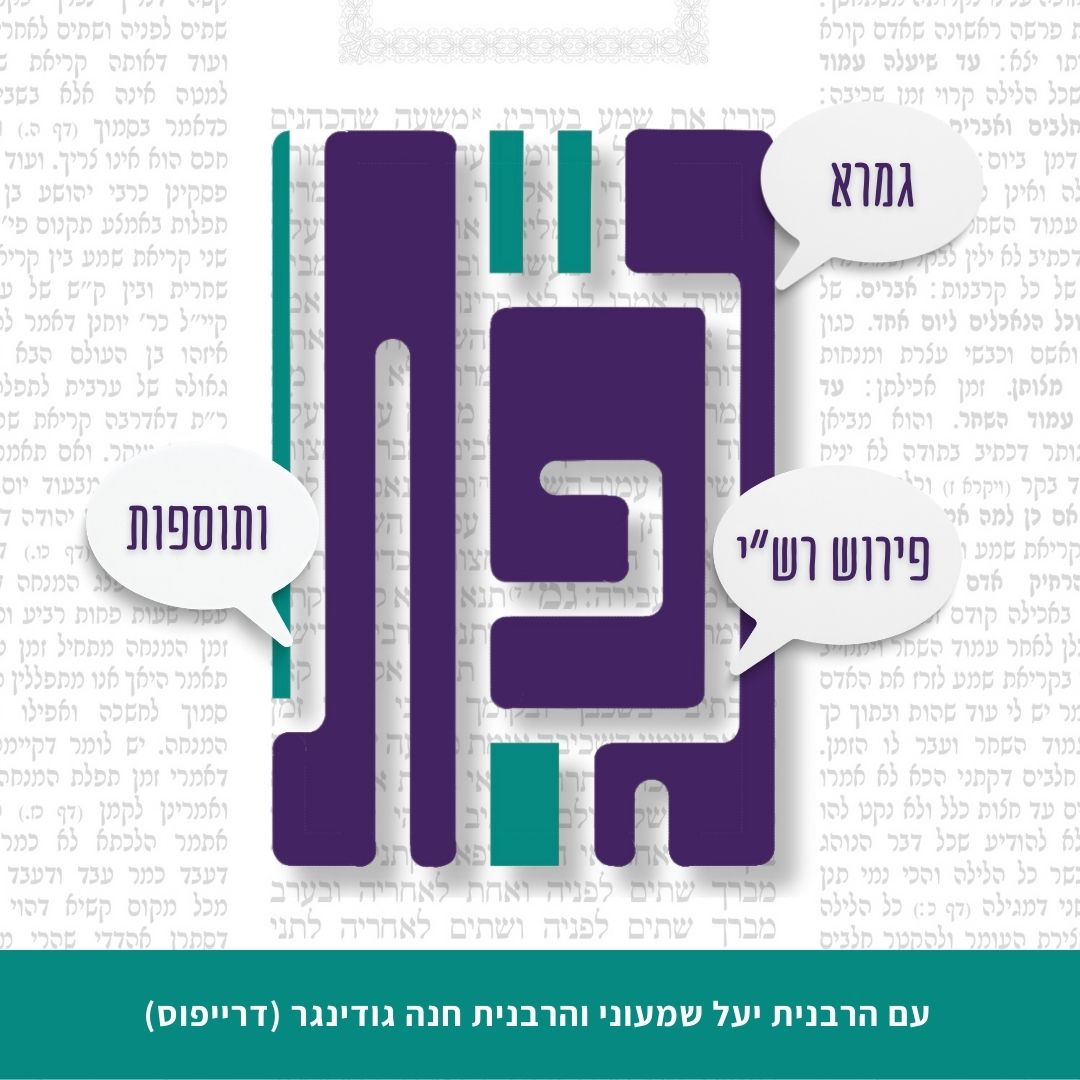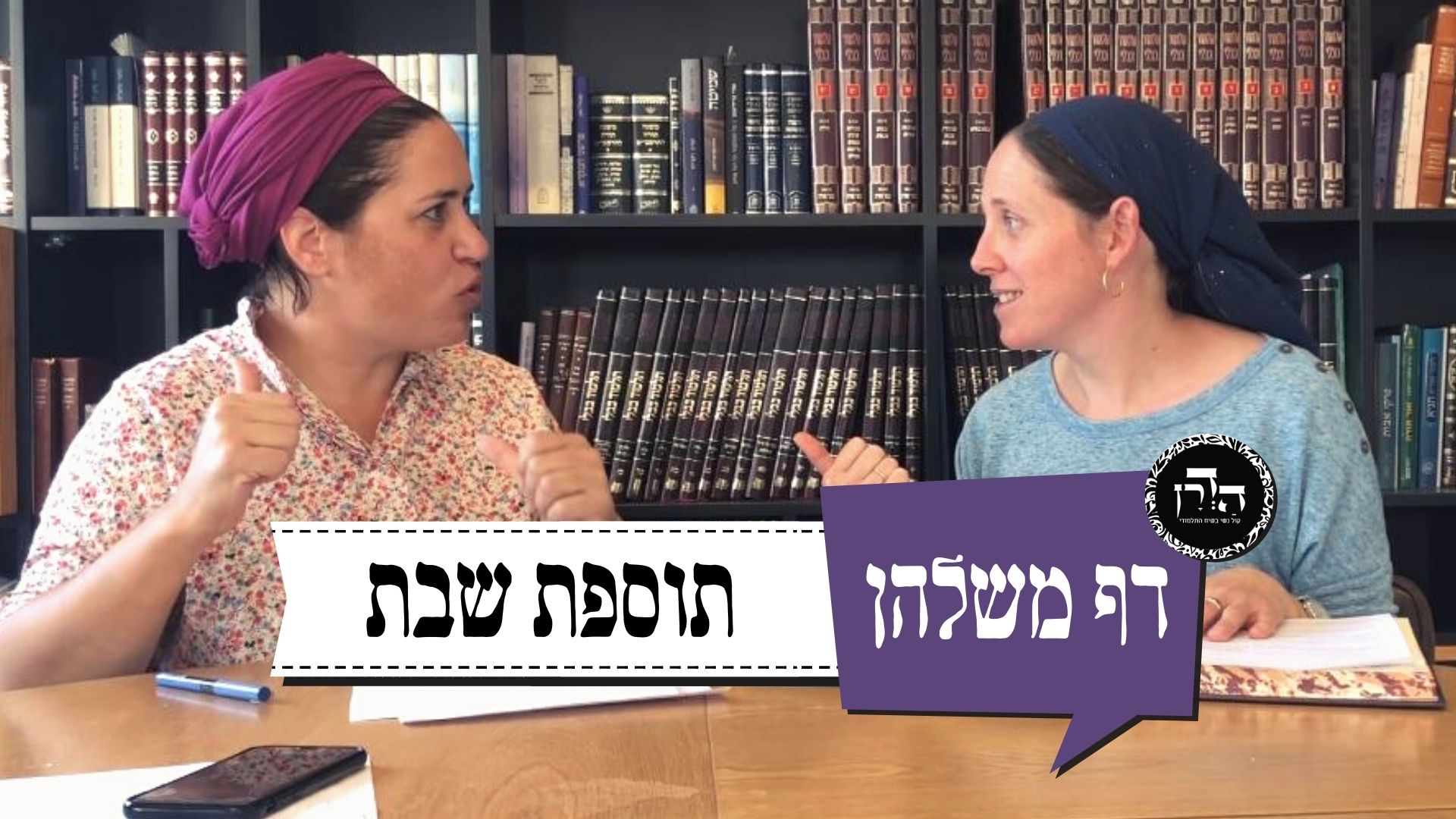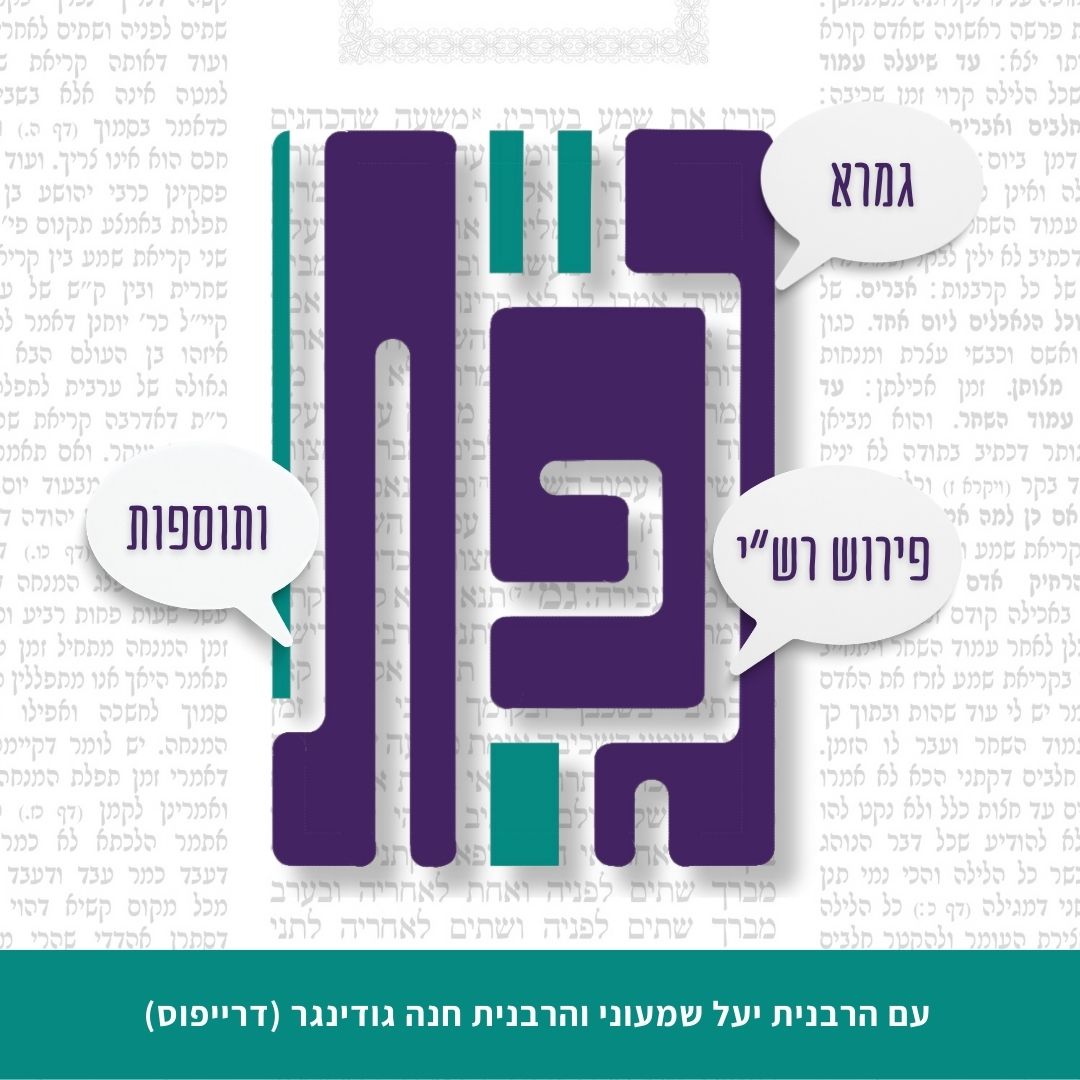האם מישהו יכול לאסור דבר שאינו שלו? לדוגמה – לשחוט בהמת חבירו לשם עבודה זרה.
הלימוד השבוע מוקדש לזכות ולשלום הַיְימׇנוֹט אֱמוּנָה בַּת באנצ’י (קָסָאוּ) בת 11 שנעלמה במקום מגוריה בצפת, לפני שנתיים, ביום ט”ז אדר תשפ”ד (25.2.24), ולא נודעו עקבותיה.
הלימוד השבוע מוקדש למען ביטחון המדינה, החיילים והאזרחים, ולמען חירותו של העם האיראני. שנזכה בקרוב שיתקיים בנו הפסוק: "לַיְּהוּדִים הָיְתָה אוֹרָה וְשִׂמְחָה וְשָׂשֹׂן וִיקָר”.
הלימוד השבוע מוקדש לזכות וְלִשְׁלוֹם הָיימָנוֹט אֱמוּנָה בַּת באנצ’י (קָסָאוּ), בת 11 שנעלמה במקום מגוריה בצפת, לפני שנתיים, ביום ט”ז אדר תשפ״ד (25.2.24), ולא נודעו עקבותיה. אנו מתפללים שֶׁתִּמָּצֵא וְתוּשַׁב לביתה במהרה!
רוצה להקדיש שיעור?

כלים
הלימוד השבוע מוקדש לזכות ולשלום הַיְימׇנוֹט אֱמוּנָה בַּת באנצ’י (קָסָאוּ) בת 11 שנעלמה במקום מגוריה בצפת, לפני שנתיים, ביום ט”ז אדר תשפ”ד (25.2.24), ולא נודעו עקבותיה.
הלימוד השבוע מוקדש למען ביטחון המדינה, החיילים והאזרחים, ולמען חירותו של העם האיראני. שנזכה בקרוב שיתקיים בנו הפסוק: "לַיְּהוּדִים הָיְתָה אוֹרָה וְשִׂמְחָה וְשָׂשֹׂן וִיקָר”.
הלימוד השבוע מוקדש לזכות וְלִשְׁלוֹם הָיימָנוֹט אֱמוּנָה בַּת באנצ’י (קָסָאוּ), בת 11 שנעלמה במקום מגוריה בצפת, לפני שנתיים, ביום ט”ז אדר תשפ״ד (25.2.24), ולא נודעו עקבותיה. אנו מתפללים שֶׁתִּמָּצֵא וְתוּשַׁב לביתה במהרה!
כלים
העמקה
רוצה להבין מה באמת קורה מתחת לפני השטח של הסוגיה?
שיעורים, פודקאסטים והרחבות של מיטב המורות שלנו יפתחו לך עוד זוויות וכיווני חשיבה.
חדשה בלימוד הגמרא?
זה הדף הראשון שלך? איזו התרגשות עצומה! יש לנו בדיוק את התכנים והכלים שיעזרו לך לעשות את הצעדים הראשונים ללמידה בקצב וברמה שלך, כך תוכלי להרגיש בנוח גם בתוך הסוגיות המורכבות ומאתגרות.
פסיפס הלומדות שלנו
גלי את קהילת הלומדות שלנו, מגוון נשים, רקעים וסיפורים. כולן חלק מתנועה ומסע מרגש ועוצמתי.
חולין מ
שנים אוחזין בסכין ושוחטין אחד לשם אחד מכל אלו ואחד לשם דבר כשר שחיטתו פסולה:
If there were two people grasping a knife together and slaughtering an animal, one slaughtering for the sake of one of all those enumerated in the first clause of the mishna and one slaughtering for the sake of a legitimate matter, their slaughter is not valid.
גמ׳ פסולה אין זבחי מתים לא ורמינהי השוחט לשום הרים לשום גבעות לשום נהרות לשום מדברות לשום חמה ולבנה לשום כוכבים ומזלות לשום מיכאל השר הגדול לשום שילשול קטן הרי אלו זבחי מתים
GEMARA: The mishna states that if one slaughters for the sake of mountains or other natural entities the slaughter is unfit. The Gemara infers: It is unfit, yes; with regard to offerings to the dead, i.e., to idols, it is not in that category. Apparently, the status of the animal is that of an unslaughtered carcass, from which benefit is permitted, and not that of an idolatrous offering, from which benefit is forbidden. And the Gemara raises a contradiction from a baraita: With regard to one who slaughters for the sake of mountains, for the sake of hills, for the sake of rivers, for the sake of wildernesses, for the sake of the sun and moon, for the sake of stars and constellations, for the sake of Michael the great ministering angel, or even for the sake of a small worm, these are offerings to the dead, from which benefit is forbidden.
אמר אביי לא קשיא הא דאמר להר הא דאמר לגדא דהר דיקא נמי דקתני דומיא דמיכאל שר הגדול ש”מ
Abaye said: The apparent contradiction between the mishna and the baraita is not difficult. This mishna that teaches that the slaughter is not valid but benefit is permitted is referring to a case where one says that he is slaughtering the animal for the sake of the mountain itself, which is not an idol. That baraita that teaches that the animal is an offering to the dead and benefit is forbidden is referring to a case where one says that he is slaughtering the animal for the sake of the angel of the mountain. The language of the baraita is also precise, as the mountain and the other natural entities are taught together with and therefore similar to Michael, the great ministering angel. Conclude from it that the tanna is referring to slaughter for the sake of a spiritual entity, not the mountain itself.
אמר רב הונא היתה בהמת חבירו רבוצה לפני עבודת כוכבים כיון ששחט בה סימן אחד אסרה סבר לה כי הא דאמר עולא אמר ר’ יוחנן אע”פ שאמרו המשתחוה לבהמת חבירו לא אסרה עשה בה מעשה אסרה
Rav Huna says: If the animal of another was prone before an idol, once one cut one siman, the windpipe or the gullet, he rendered the animal forbidden. He holds in accordance with that which Ulla says that Rabbi Yoḥanan says: Although the Sages said that one who bows to the animal of another does not render it forbidden, if he performed a sacrificial rite upon it he renders it forbidden. The case cited by Rav Huna involves an action of that kind, cutting one siman; therefore, the animal is forbidden.
איתיביה רב נחמן לרב הונא השוחט חטאת בשבת בחוץ לעבודת כוכבים חייב שלש חטאות ואי אמרת כיון ששחט בה סימן אחד אסרה אשחוטי חוץ לא ליחייב
Rav Naḥman raised an objection to the opinion of Rav Huna from a baraita: One who unwittingly slaughters an animal that was designated as a sin offering on Shabbat outside the Temple, for idol worship, is liable to bring three sin offerings: One for performing the prohibited labor of slaughtering on Shabbat, one for slaughtering a sacrificial animal outside the Temple, and one for slaughtering an animal for idol worship. And if you say that once he cuts one siman he renders the animal forbidden as an idolatrous offering, then let him not be liable to bring a sin offering for slaughter of a sacrificial animal outside the Temple courtyard,
מחתך בעפר הוא אמר רב פפא הכא בחטאת העוף עסקינן דכולהו בהדי הדדי קאתי
as it is as though he is merely chopping in dirt, since one is not liable for slaughtering outside the Temple courtyard a sacrificial animal unfit for sacrifice. Rav Pappa said: Here we are dealing with a bird sin offering, for which the requirement is to cut only one siman, and when cutting that siman, all of the three prohibitions come to be violated simultaneously.
מכדי רב הונא כמאן אמרה לשמעתיה כעולא ועולא מעשה כל דהו קאמר
The Gemara asks: Now in accordance with whose opinion did Rav Huna state his halakha? It is in accordance with the opinion of Ulla, who says: If he performed a sacrificial rite upon the animal, he renders it forbidden. And Ulla says that a minimal action renders the animal forbidden, as his ruling applies even to cutting one siman. According to Ulla’s opinion, the moment that he begins the incision, the animal is forbidden and unfit to be sacrificed. Consequently, when he completes the slaughter outside the Temple, it is as though he is chopping dirt. Why then is he liable to bring a sin offering for slaughter of a sacrificial animal outside the Temple courtyard?
אלא באומר בגמר זביחה הוא עובדה
The Gemara answers: Rather, the baraita is referring to a case where one says prior to the slaughter that he is worshipping the idol only at the conclusion of the slaughter; therefore, only then is the animal rendered forbidden, and one is liable for all three sin offerings simultaneously.
אי הכי מאי איריא חטאת לישמעינן זבח
The Gemara asks: If so, why does the tanna teach the halakha specifically with regard to a sin offering? Let him teach us the halakha with regard to any type of offering. According to Rav Pappa, by contrast, it is clear why the tanna taught the halakha with regard to a sin offering.
אלא אמר מר זוטרא משמיה דרב פפא הכא במאי עסקינן כגון שהיה חצי קנה פגום והוסיף עליו כל שהוא וגמרו דכולהו בהדי הדדי קאתיין
The Gemara returns to Rav Pappa’s interpretation of the baraita as referring to the case of a bird sin offering. The previous difficulty then resurfaces, that the bird was rendered forbidden before the slaughter was completed, as according to Rav Huna and Ulla any minimal action renders the bird forbidden. Rather, Mar Zutra said in the name of Rav Pappa: What are we dealing with here in the baraita? It is a case where half of the windpipe was deficient before the slaughter, and the slaughterer added to that deficiency an incision of any size, and completed it. The minority of the windpipe had been cut before the slaughterer cut it further, completing the act of slaughter. As in that case all of the three prohibitions come to be violated simultaneously.
אמר רב פפא אי לאו דאמר רב הונא סימן אחד לא הויא חטאת תיובתיה מאי מעשה מעשה רבה
Rav Pappa said: If not for the fact that Rav Huna said that it is sufficient to cut one siman on the animal for idol worship to render it forbidden, the fact that the baraita mentions a sin offering specifically would not raise a difficulty for his opinion. In that case, one could explain: What is the action that renders the animal forbidden according to Ulla? It is a significant action, i.e., completion of the slaughter for idol worship, that renders the animal forbidden.
ואמר רב פפא אי לאו דאמר רב הונא בהמת חברו לא הויא חטאת תיובתיה מאי טעמא דידיה מצי אסר דחבריה לא מצי אסר
And Rav Pappa said: If not for the fact that Rav Huna stated his halakha specifically with regard to the animal of another, the fact that the baraita mentions specifically a sin offering would not raise a difficulty for his opinion. One could then explain: What is the reason that the animal designated as a sin offering is not rendered forbidden at the beginning of the slaughter? It is due to the fact that one is able to render his animal forbidden, but one is not able to render the animal of another forbidden. It is the priests who are entitled to derive benefit from the flesh of a sin offering.
פשיטא מהו דתימא כיון דקני ליה לכפרה כדידיה דמיא קמ”ל
The Gemara objects: That is obvious. The Gemara explains: Rav Pappa needs to state this, lest you say that since one who brings a sin offering acquires the animal for his atonement, its status is like that of an animal that is his. Therefore, Rav Pappa teaches us that this does not suffice that the animal be considered his.
(נעץ סימן) רב נחמן ורב עמרם ורב יצחק אמרי אין אדם אוסר דבר שאין שלו
The Gemara provides a mnemonic for the names of the amora’im who participate in the discussion that ensues: Nun, Rav Naḥman; ayin, Rav Amram; tzadi, Rav Yitzḥak. Rav Naḥman, and Rav Amram, and Rav Yitzḥak all say: A person does not render forbidden an item that is not his.
מיתיבי השוחט חטאת בשבת בחוץ לעבודת כוכבים חייב שלש חטאות ואוקמינן בחטאת העוף ובחצי קנה פגום טעמא דחטאת העוף הוא דכולהו בהדי הדדי קאתיין
The Gemara raises an objection from a baraita: One who unwittingly slaughters an animal that was designated as a sin offering on Shabbat outside the Temple for idol worship is liable to bring three sin offerings. And we interpreted the baraita as being in the case of a bird sin offering, and in a case where half of the windpipe was deficient. The reason for the triple liability is that it is a bird sin offering, as then, all of the three prohibitions come to be violated simultaneously.



